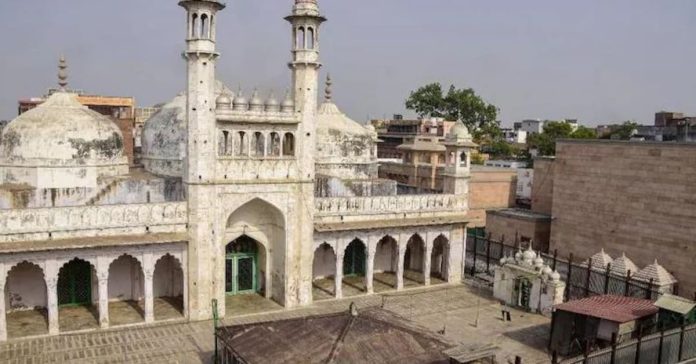Gyanvapi Mosque is located in Banaras, UP. The style of construction of the mosque is as per the Mughal architecture. As per historians, Mughal Ruler Aurangazeb is the founder of the mosque.
Gyan Vapi
The name Gyan Vapi is derived based on the well adjoining the mosque. It can be translated as “well of knowledge”. It is said on oral account that the well was dug by Lord Shiva himself to cool down the lingam.
History
Catherine B. Asher, author and researcher wrote in the book, “Architecture of Mughal India,” that the mosque is built by destroying Vishwanath temple in 1669. The Vishwanath temple was built by Raja Man Singh during Akbar’s rein.
The book said that Aurangzeb destroyed the temple as a warning to revolting Brahmins in Banaras. Aurangzeb wanted to make people know about his displeasure politically and religiously in Banaras. The book also noted that the construction of Mosque is not cited in any Mughal text.
According to Hans Bekker a historian, he mentioned that, the original temple was uprooted by Qutb al-Din Aibak upon the defeat of Raja Jayachandra. Subsequently, the Razia Mosque was constructed in its place.
Historian SP Udaykumar stated in his book “Ramarajya” that the temple later was rebuilt by a Gujarati merchant during the reign of Iltutmish and again demolished by either Hussain Shah Sharqi, Sikandar Lodhi. During the reign of Akbar, Raja Man Singh got the temple re-constructed.
Colonial Indian claims
In the early 18 century, the city was in the control of the Nawabs of Lucknow. Many petitions were submitted from rulers across the nation to claim cultural authority back. Despite these efforts, the dispute didn’t come to a conclusion due to various interventions.
British authorities feared an outbreak of communal tensions. Later, when East India Company gained control over Banaras, it constructed the present Kashi Vishwanath Temple to the south of the mosque. However, pilgrims felt that this was ritually inconsistent. Supposedly, the original lingam was hidden inside Gyanvapi well during Aurangzeb’s raid.
Postcolonial Indian claims
1984, the Vishwa Hindu Parishad, engaged a campaign to reclaim the mosques built by demolishing Hindu temples. However, as the Gyanvapi mosque is actively used, court has declined the request in 1992.The court cases of pleading and challenging have been going on for over 22 years.
The city court has ordered Archeological Survey of India to proceed with the requested survey of the mosque on 8 April 2021. A committee consisting five members was constituted to carry the survey. The committee included two minority members along with experts in archeology.
A challenge was filed by the defendants in the Allahabad High Court. Allahabad High court ordered that the survey to put on hold indefinitely. Finally, after one year, on 26 April 2022, a video graphic survey of the Mosque-Temple complex was ordered by Civil Judge of Varanasi.
Video graphic Survey claims
The survey started on 6 May. However, the next day they faced large protests. Eventually, the survey had to be put on hold. Later, heavy police forces were deployed and the survey was continued.
The team inspected the basement rooms and locked the rooms which were opened. As the survey ended peacefully, they claimed that they found a Shivlinga inside the mosque. Following that, the area where the Shivlinga was found is sealed.
ALSO READ: Kashi Vishwanath – Gyanvapi Mosque dispute: Another Mandir-Masjid row
Experts claim
Mary Searle-Chatterjee, author and historian claims that the events happened in the history cannot be claimed as facts always. She says, “The historical issues are irrelevant, since it is clear that whatever the facts were, accounts of the origin of the central ruin are now functioning as symbolic narrative, providing a charter for contemporary attitudes and behavior.”
Conclusion
The Mosque-Temple complex was contested by both the religious groups for over 100years. It is our duty to restore historic relics. Court may issue order in favor or it can be ruled out.
But it is our responsibility to show respect to all the religions as India is a secular nation. Controversies tend to happen when various religion groups strive to live in one place. Amidst the controversies, it is the responsibility of every citizen to recognize “unity in diversity”.
ALSO READ: Begumpur Mosque: first Four Iwan Style Mosque of India[PHOTO STORY]


